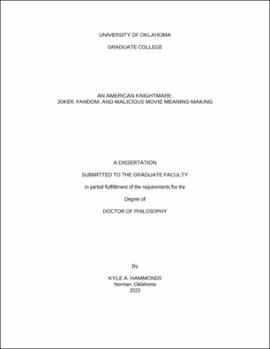| dc.description.abstract | This monograph concerns the long-standing communication problem of how individuals can identify and resist the influence of unethical public speakers. Scholarship on the issue of what Socrates & Plato called the “Evil Lover” – i.e., the ill-intended rhetor – began with the Greek philosophers, but has carried into [post]Modern anxieties. For instance, the study of Nazi propaganda machines, and the rhetoric of Hitler himself, rejuvenated interest in the study of speech and communication in the U.S. and Europe. Whereas unscrupulous sophists used lectures and legal forums, and Hitler used a microphone, contemporary Evil Lovers primarily draw on new, internet-related tools to share their malicious influence. These new tools of influence are both more far-reaching and more subtle than the traditional practices of listening to a designated speaker appearing at an overtly political event. Rhetorician Ashley Hinck has recently noted the ways that popular culture – communication about texts which are commonly accessible and shared – are now significant sites through which citizens learn moral and political values. Accordingly, the talk of internet influencers who interpret popular texts for other fans has the potential to constitute strong persuasive power regarding ethics and civic responsibility.
The present work identifies and responds to a particular case example of popular culture text that has been recently, and frequently, leveraged in moral and civic discourses: Todd Phillips’ Joker. Specifically, this study takes a hermeneutic approach to understanding responses, especially those explicitly invoking political ideology, to Joker as a method of examining civic meaning-making. A special emphasis is placed on the online film criticisms of Joker from white nationalist movie fans, who clearly exemplify ways that media responses can be leveraged by unethical speakers (i.e., Evil Lovers) and subtly diffused. The study conveys that these racist movie fans can embed values related to “trolling,” incelism, and xenophobia into otherwise seemingly innocuous talk about film. While the sharing of such speech does not immediately mean its positive reception, this kind of communication yet constitutes a new and understudied attack on democratic values such as justice and equity. The case of white nationalist movie fan film criticism therefore reflects a particular brand of communicative strategy for contemporary Evil Lovers in communicating unethical messages under the covert guise of mundane movie talk. | en_US |

